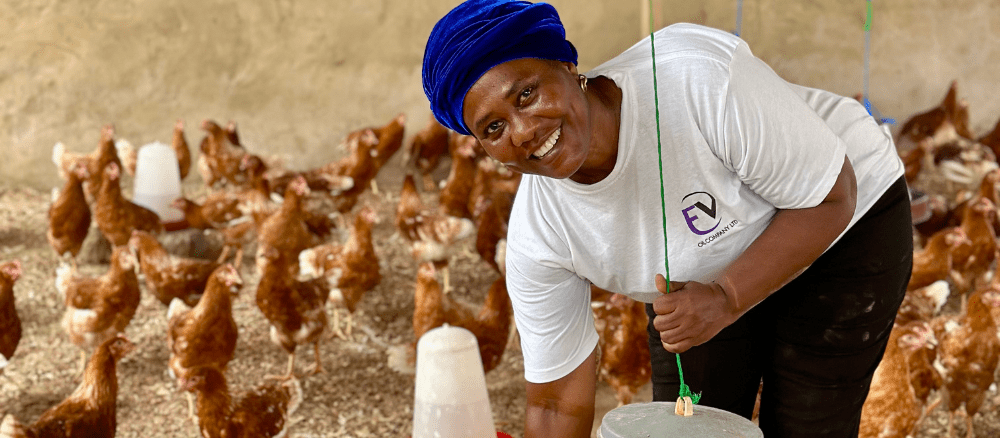#VETSVolunteerVoices aims to bring you stories of our passionate VETS program volunteers from the field. This blog was written by Karissa Gall, a Communications and Gender Advisor who supported our VETS partner, Apex Body of Women in the Poultry Value Chain (WIPVaC-Apex) in Ghana earlier this year (January-February 2025).
A Name Rooted in Identity
For Esther Nyarko, a small-scale poultry farmer in Ghana’s Eastern Region, her farm’s name carries deep meaning. EnoNyarkoa Farms combines Akan words that reflect her identity—‘Eno’ meaning an elder and a source of wisdom, and ‘Nyarko,’ her surname. She also incorporated her traditional Akan name, Yaa (given to those born on a Thursday) to create a name that represents both her heritage and her journey in poultry farming.
“I love the name,” Esther shared during a recent visit to her farm. “In short, you can say ‘EN Farms,’ but I enjoy the full name—EnoNyarkoa Farms.”
Esther also loves her birds. When she started her farm with 200 chickens, she was full of passion but had little experience. At first, she struggled with disease outbreaks and management challenges, losing birds along the way. But she refused to give up. Through training, persistence, and a deep commitment to improving her farm, she has since grown her flock to over 1,000 layers and now also raises cockerels and broilers for festive seasons like Christmas and Easter. Seeing her birds thrive fills her with joy and fulfillment.
 PHOTO: Esther Nyarko, small-scale poultry farmer.
PHOTO: Esther Nyarko, small-scale poultry farmer.
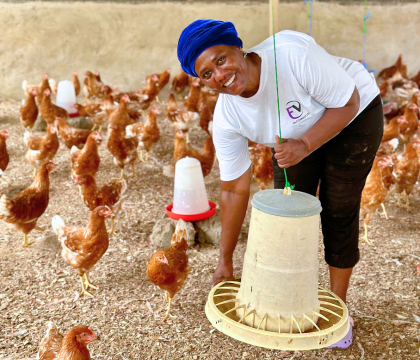 PHOTO: Esther carefully tending to the feeders and drinkers.
PHOTO: Esther carefully tending to the feeders and drinkers.
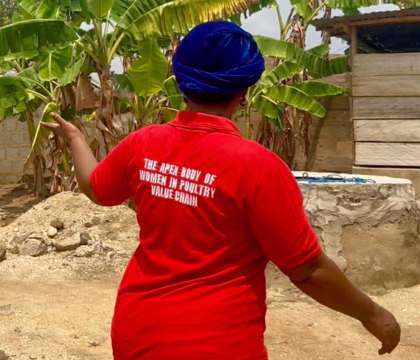 PHOTO: Esther proudly showing her WIPVaC-Apex t-shirt.
PHOTO: Esther proudly showing her WIPVaC-Apex t-shirt.
Promoting Well-Being Through Biosecurity
Esther’s turning point came when she joined Apex Body of Women in the Poultry Value Chain (WIPVaC-Apex), a national organization headquartered in Accra with chapters across Ghana, dedicated to improving the lives of women poultry farmers. As a VETS program partner, WIPVaC-Apex and VWB share a commitment to One Health and women’s economic empowerment. Through VETS, Canadian volunteers support WIPVaC-Apex in implementing One Health initiatives, strengthening capacity, and delivering training and workshops.
For example, biosecurity training helps women farmers understand the critical links between human, animal, and environmental health. By adopting better farm management practices, they can reduce disease risks, increase productivity, and improve their economic stability.
“We were given a whole lot of training that helped me take better care of my birds,” Esther shared. “You need to give them clean water, good food, and ensure that their feeders and drinkers are washed properly. When you do, you’ll see that the birds are even happier.”
By implementing biosecurity measures—such as building a protective wall around her farm, routinely cleaning and disinfecting equipment, and controlling farm access—Esther has significantly reduced disease risks and the need for emergency veterinary services. The cost savings have allowed her to reinvest in her farm and grow her business.
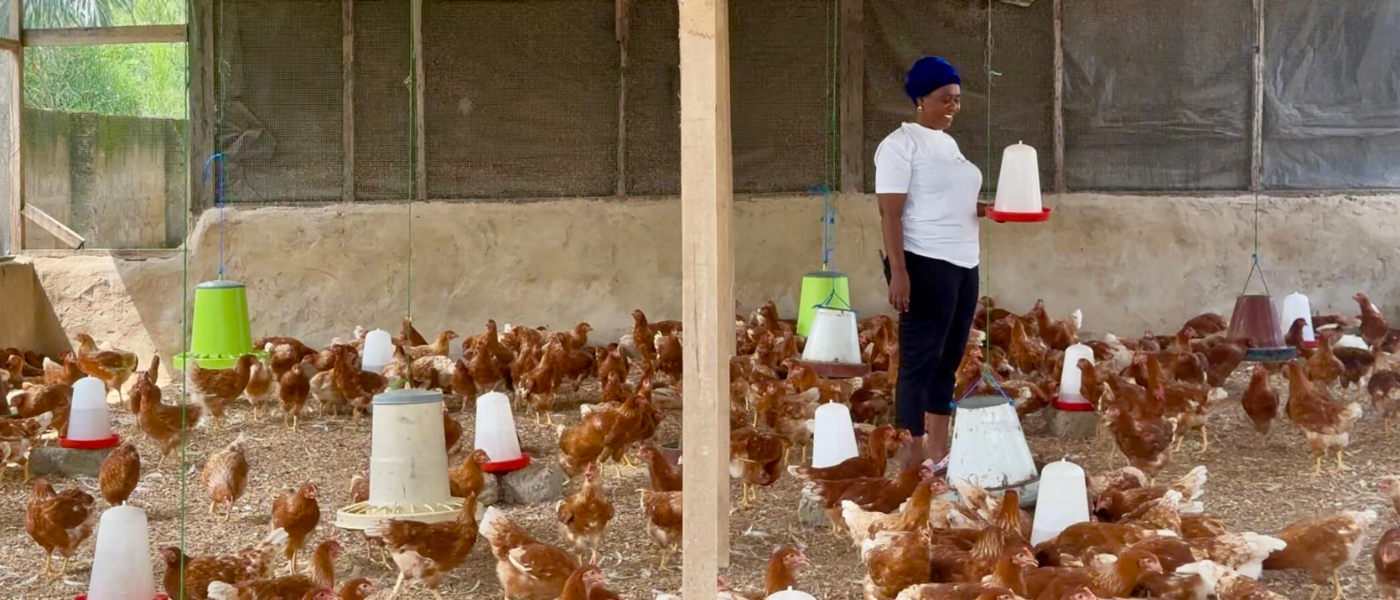 PHOTO: Esther Nyarko tends to the feeders and drinkers inside her poultry pen, where she has expanded her farm from 200 chickens to over 1,000 egg-laying hens.
PHOTO: Esther Nyarko tends to the feeders and drinkers inside her poultry pen, where she has expanded her farm from 200 chickens to over 1,000 egg-laying hens.
“Now that biosecurity has become a part of me and I’ve seen how keeping the environment clean helps, I’m seeing real results,” she said. “When my birds lay, production increases, and after selling, I can reinvest and expand. I don’t need to go to the bank for a loan because of this biosecurity.”
Building Capacity for Positive Change
With money saved from reduced veterinary costs and increased poultry sales, Esther is working toward a dream she once thought was out of reach—building a home for herself and her family. “I even bought a plot of land in my hometown,” she said. “By the end of this flock’s cycle, I know I’ll be able to mobilize the resources to start construction.”
Her success has inspired her to share what she’s learned with other women poultry farmers in her region. As the regional president for WIPVaC-Apex in Ghana’s Eastern Region, she is committed to empowering more women with the knowledge and skills needed to succeed in poultry farming.
“This training has empowered women a lot,” Esther said. “Now we have the knowledge, the skills, and the confidence to grow our farms and our futures.”
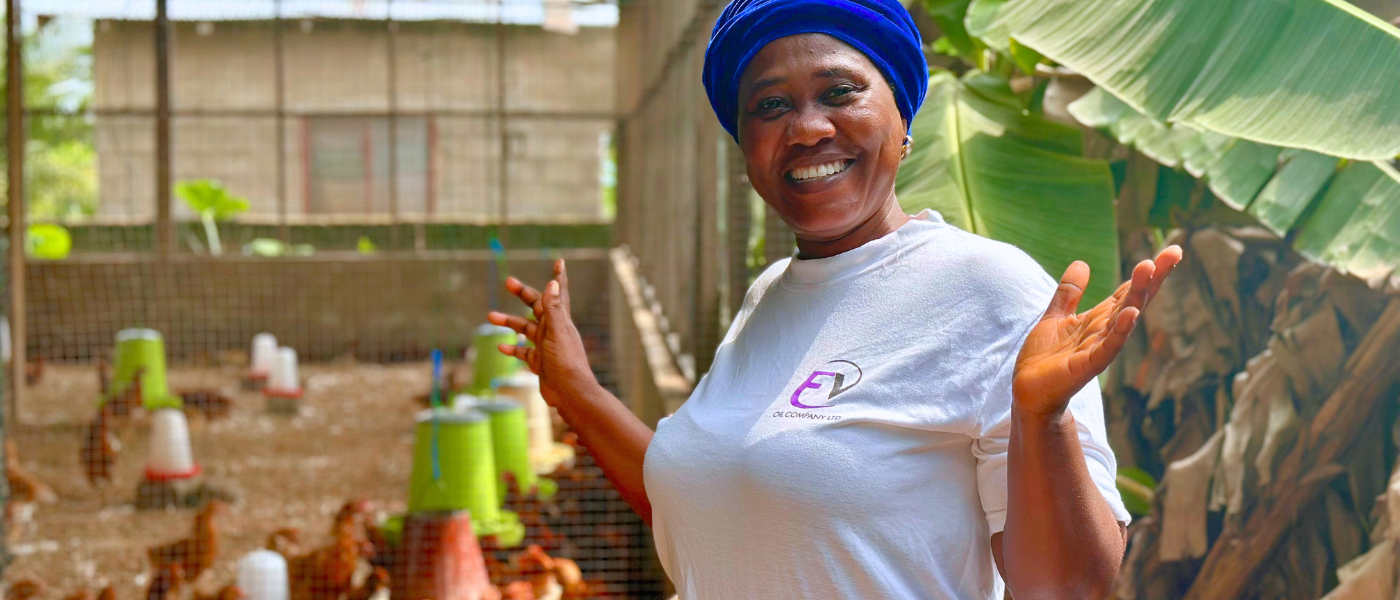 PHOTO: Beaming with pride, Esther Nyarko is building a brighter future for herself, her family, and other women poultry farmers in her community.
PHOTO: Beaming with pride, Esther Nyarko is building a brighter future for herself, her family, and other women poultry farmers in her community.
VETS is an 8-year initiative (2020-2028) to improve the economic and social well-being of marginalized people, particularly women and girls, in 6 countries across Africa and Asia. In collaboration with local partners, the program is implemented through 190 Canadian volunteers on international assignment and is generously funded by Global Affairs Canada. Learn more.

